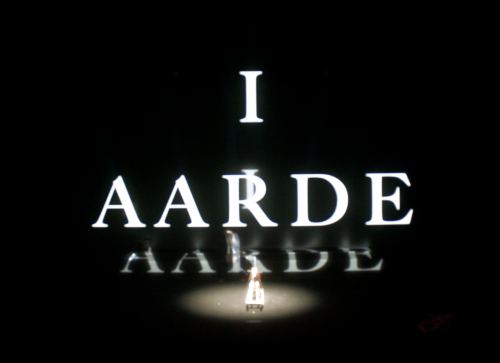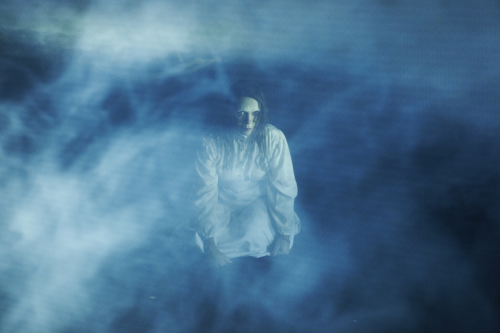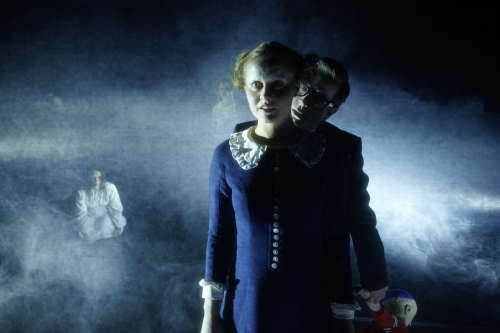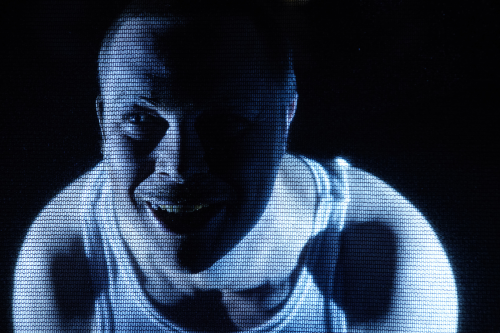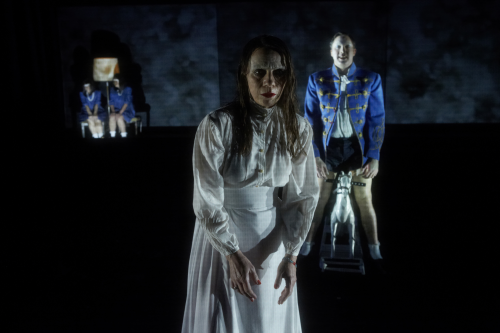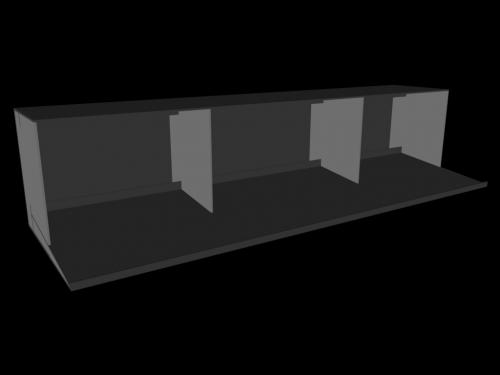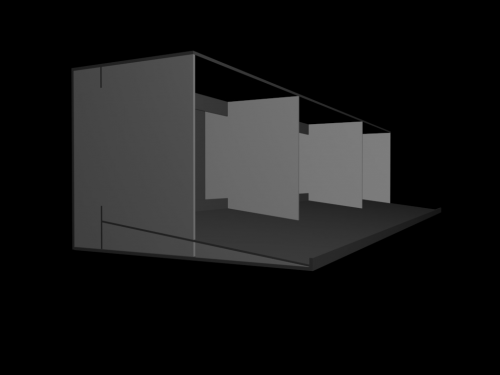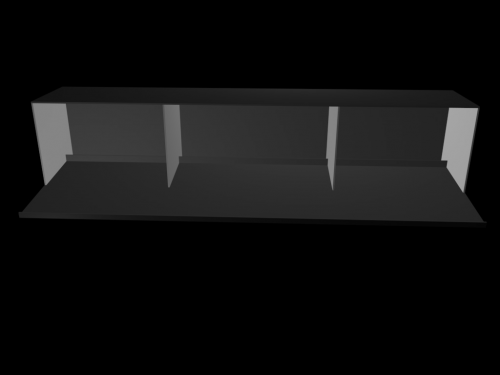User:Lena Mueller/Lena Mueller Little Eyolf 2012: Difference between revisions
Lena Mueller (talk | contribs) (→Photos) |
Lena Mueller (talk | contribs) No edit summary |
||
| Line 1: | Line 1: | ||
= | = Languages of Film and Theatre = | ||
== Description == | == Description == | ||
For the graduation show, I have made a short film-document that illustrates how my engagement with film as a medium has influenced my work as a theatre designer. Since starting my studies at Piet Zwart Institute, I have completed three theatrical designs. Each project reflects on the nature of the frame and the cinema screen, merging their properties with the perspectives of theatrical space. All these projects approached the presence of the screen differently. | |||
Firstly, a production of Harold Pinter’s The Birthday Party (directed by Susanne Kennedy) creates the illusion of a screen by putting the actors inside a framed rectangular box within a greater, darkened space, like people moving inside a television screen. The second project is Dea Loher’s Land Without Words (directed by Jaap Spijkers). This time an actor moves before and behind an actual semi-transparent screen, one that is also used as a canvas for painting. By placing the screen diagonally, and making it larger than any audience member could take in with one glance, the design creates an experience of depth. The last project, Susanne Kennedy’s version of Henrik Ibsen’s Little Eyolf, is the only one where images are projected into the design. This design fuses elements from the previous two projects. A gauze screen separates actors from the audience; sometimes this screen forms a barrier onto which text is projected; sometimes, when the space is lit where the actors perform, it offers a window into their claustrophobic world. At the back of the space is a second screen onto which images from medical films (microbes and blown-up x-rays) and of clouds appear, presenting the elemental aspects of the characters’ experience. | |||
Although I have used elements from film and video before, these three works together form a trio, a way of making the ideas and practices explored in the Masters course at Piet Zwart Institute my own. | |||
== Media == | == Media == | ||
=== Photos === | === Photos === | ||
Revision as of 21:57, 5 July 2012
Languages of Film and Theatre
Description
For the graduation show, I have made a short film-document that illustrates how my engagement with film as a medium has influenced my work as a theatre designer. Since starting my studies at Piet Zwart Institute, I have completed three theatrical designs. Each project reflects on the nature of the frame and the cinema screen, merging their properties with the perspectives of theatrical space. All these projects approached the presence of the screen differently. Firstly, a production of Harold Pinter’s The Birthday Party (directed by Susanne Kennedy) creates the illusion of a screen by putting the actors inside a framed rectangular box within a greater, darkened space, like people moving inside a television screen. The second project is Dea Loher’s Land Without Words (directed by Jaap Spijkers). This time an actor moves before and behind an actual semi-transparent screen, one that is also used as a canvas for painting. By placing the screen diagonally, and making it larger than any audience member could take in with one glance, the design creates an experience of depth. The last project, Susanne Kennedy’s version of Henrik Ibsen’s Little Eyolf, is the only one where images are projected into the design. This design fuses elements from the previous two projects. A gauze screen separates actors from the audience; sometimes this screen forms a barrier onto which text is projected; sometimes, when the space is lit where the actors perform, it offers a window into their claustrophobic world. At the back of the space is a second screen onto which images from medical films (microbes and blown-up x-rays) and of clouds appear, presenting the elemental aspects of the characters’ experience. Although I have used elements from film and video before, these three works together form a trio, a way of making the ideas and practices explored in the Masters course at Piet Zwart Institute my own.
Media
Photos
Video
Essay
- Thesis in progress click here to download
Bibliography
- Rosenblum, Robert, Modern Painting and the Northern Romantic Tradition: Friedrich to Rothko (London: Thames and Hudson, 1975)
- Burke, Edmund, A Philosophical Enquiry into the Sublime and Beautiful and Other Pre-Revolutionary Writings (London: Penguin Books, 1998)
- Lyotard, Jean-Francois, „Newman: The Instant“ in The Inhuman (Stanford: Stanford University Press, 1988)
- McFarlane, James, ed., Henrik Ibsen: Penguin Critical Anthologies (Harmondsworth: Penguin, 1970).
- Merx, Sigrid, “Swann’s way: video and theatre as an intermedial stage for the representation of time” in: Ed. Freda Chapple and Chiel Kattenbelt Intermediality in Theatre and Performance (Amsterdam: Rodopi, 2006).
- Andrew, Malcolm, Landscape and Western Art (Oxford: Oxford University Press, 1999).
- Greg Giesekam, Staging the Screen: The Use of Film and Video in Theatre (Theatre & Performance Practices) (Palgrave Macmillan, 2007).
- Sarah Bay-Cheng, Chiel Kattenbelt, Andy Lavender, ed., Mapping Intermediality in Performance (Amsterdam: Amsterdam University Press, 2011)
- Denis Cosgrove, Stephen Daniels, ed., The Iconography of Landscape: Essays on the Symbolic Representation, Design and Use of Past Environments (Cambridge: Cambridge University Press, 1989)
- Moi, Toril, Henrik Ibsen and the Birth of Modernism (Oxford: Oxford University Press, 2006).
- Eisenstein, Sergei, Film Form, Essays in Film Theory (San Diego: Harcourt Brace Jovanovich, 1977)
Additional Information
- One page itemised budget estimate

